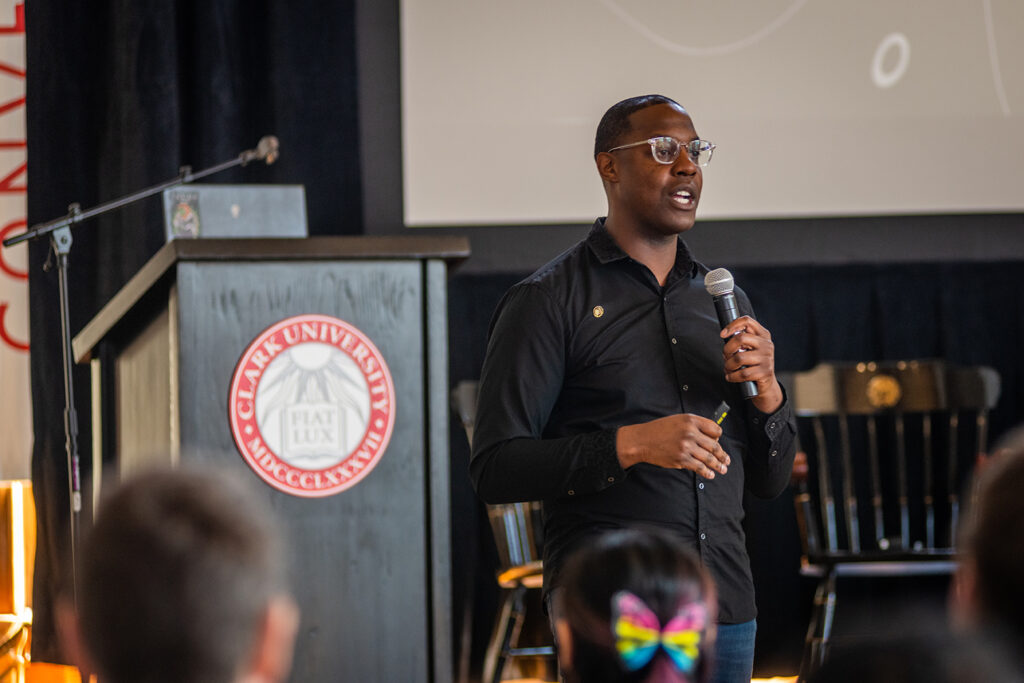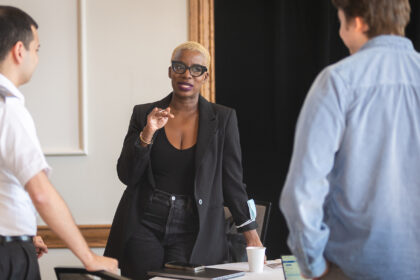‘I’m passionate about bringing more access to underrepresented individuals’

Danny Martin realized the allure of gaming when he saw sunlight peeking through the window blinds after he’d spent all night with a console in his hands. He was a high school student growing up in a rough part of Dallas, and these gaming marathons were not only an opportunity to temporarily escape his personal circumstances but also provided a “soul-warming” experience with friends.
“I recognized that time elapsed so quickly because I was having so much fun,” Martin marveled. “From then, I always told myself I wanted to go into an industry where I felt that exact same feeling and not have to worry about the time.”
Martin did just that, eventually becoming co-founder and CEO of Ēsposure, a global educational technology company that delivers immersive learning experiences and a gamified learning platform to increase access and resources for future innovators. He described his journey, and his hopes for a more welcoming game culture, during his keynote speech to open Monday’s daylong conference at Clark that examined issues of diversity and inclusion in the esports realm through a series of panel discussions.
Martin said his industry must work to remove the economic barriers that hinder many young Black people from fully participating in esports and advancing in the gaming world. “This spins in my head all the time,” he said. “I’m passionate about bringing more access to individuals who are underrepresented.”
Today, Martin makes his 8,000-square-foot esports studio and education center in Dallas available to schools whose students do not have access to esports programs because of economic challenges. When he approached investors to assist with developing the facility, most urged him to locate it in an affluent area, “but I wanted to have an impact on someone who experienced the same hardships that I did.”
Gaming fosters collaboration, communication, and critical thinking, as well as the ability to manipulate a keyboard or console — skill sets that help players thrive in a host of professions, Martin said. Esports has the potential to influence the next generation of superstars in a number of fields, he added, but those players need access and resources.
“Esports is not all equitable, or diverse, or inclusive,” he told the audience, “but you have the capability of growing this industry.
“The stories of triumph that we see from individuals who came from nothing are truly what make esports the best industry in the world.”
In his opening remarks, Clark President David Fithian noted that prior to 2021, Clark had one esports team with three players. Today, Clark Esports has 20 competitive teams, made up of about 80 players, and hundreds more casual gamers across campus whose goal is to have fun. About 500 students in all participate in the esports program.
“The participation of these 500 students reflects our intentional efforts to foster an inclusive and welcoming environment for all enthusiasts here at Clark regardless of skill level and consistent with our values and priorities,” Fithian said. “At Clark, there is a place for everyone at the game controls. And we are working very hard to make sure everyone knows there is a seat waiting for them. That gets to the heart of why we are here today.
“Moving toward an esports culture that is more welcoming and tolerant is not only the right thing to do, but it’s also an essential strategy as it enables esports entities to capture the widest — and, I’d add, the most interesting — audience possible. Clark University is proud to be a part of this momentum.”

Joining a range of Clark experts on the discussion panels were leaders from institutions and companies across the gaming and tech industries, including LG, Amazon, Electronic Arts, and universities including the United States Military Academy West Point, New York University’s Tisch Institute for Global Sport, Mount St. Mary’s University, and Slippery Rock University.
During the panel “Diversity, Equity, and Inclusion at the Intersection of Esports,” Paul Cotnoir, dean of the Becker School of Design & Technology at Clark, spoke about the explosive growth of collegiate esports and how Clark’s involvement can help advance discussions about diversity and inclusivity within the industry. Fellow panelist Aaron Haddock, director of behavioral health initiatives for the Mosakowski Institute for Public Enterprise, noted that esports represents “a chance to be a part of a community and show up as yourself, make friends, and drop the anonymity that is usually associated with playing games online.”
Danielle Rourke, senior strategist for higher education at Dell, led a panel titled “Esports and Toxicity: Changing the Tide,” which grappled with how to tackle bullying and bad behavior in online games. Participants considered how the esports industry can root out bad behavior to create a safer environment for all gamers. Among the issues explored were the role social media influencers can play in promoting good behavior in esports, and how to support certain groups that are disproportionately affected by toxicity in gaming.
Other panels explored the topics of “Professional Esports Organizations and DEI” and “Collegiate Esports and Inclusivity,” from which a white paper is expected to be generated.
Verta Maloney, co-founder of the*gameHERs — a women-led community dedicated to amplifying and centering the voices and roles of women gamers and femme-identifying gamers — delivered a lunchtime plenary lecture.
The conference — one of the first of its kind in the U.S. — was organized by Clark’s esports executive team of Alan Ritacco, associate vice president for external relations and senior fellow for electronic arts, computer science, and esports; Danielle Manning, executive vice president, chief financial officer, and treasurer; John LaBrie, dean of the School of Professional Studies and associate provost for professional education, and esports coach Shifty (Nicholas Travis), and co-sponsored by the Office of the President, Office of Diversity and Inclusion, Office of the Provost, Division of Student Success, and School of Professional Studies.
Ed Greig ’23 contributed to this article.


